- Home
- Tobias Wolff
In the Garden of the North American Martyrs Page 4
In the Garden of the North American Martyrs Read online
Page 4
“You mean,” Riley said, “that you spoke from the right point of view and he spoke from the wrong point of view.”
“I think so. What do you think?”
“I don’t know the period as well as I should,” Riley said, “but I thought his ideas seemed original. They were interesting enough.”
“Interesting,” Brooke said, “in the way flat-Earth theories are interesting.”
“I envy you,” Riley said. “You’re always so sure of yourself.”
The student looked at his watch. “Uh-oh,” he said. “I have to be going.”
“I’m not always sure of myself,” Brooke said. “But this time I am.”
“I wasn’t just thinking of the panel.” Riley reminded Brooke of the tenure committee meeting the previous week. He wanted to know how Brooke could deny work to a woman with a sick husband and three children. He wanted to know how Brooke justified that to himself.
“We were asked to consider her professional qualifications,” Brooke said. “She’s a terrible teacher, as you very well know, and she hasn’t published anything in over four years. Not even a book review.”
“It was that simple, was it?”
“It wasn’t simple at all,” Brooke said. “If there was anything I could do for her short of giving her tenure I would do it. Now if you’ll excuse me I’m going out for some fresh air.”
A cold, salty breeze was blowing in off the water. The streets were empty. Brooke walked around the hotel several times, nodding to the doorman as he passed the entrance. The street lights were on, and some mineral embedded in the concrete made it glitter in a false and irritating way.
He decided that he was right and Riley wrong. But why did he feel so awful? It was ridiculous. He would have a bite to eat and drive home that very night. Riley could find another ride.
As he left the hotel restaurant Brooke saw the blonde woman—Ruth—standing in the lobby. He was about to turn away but just then she looked in his direction and smiled and waved. She was plainly glad to see him and Brooke decided to say hello. Not to do so, he thought, would be rude. They sat side by side in chairs that had, for some reason, been bolted to the floor. In the chairs across from them two scoutmasters were arm-wrestling. Ruth’s perfume smelled like lavender; it came over Brooke in waves. He wanted to close his eyes and breathe it in.
“I called the library,” she said, “but they didn’t have either one of your books.”
“That doesn’t surprise me,” Brooke said. He explained that they were too specialized to be of interest to the general public.
“I’d still like to read them,” Ruth said. “There are people in the literary society who write things, haikus and so on, but I’ve never met anyone before who wrote a book, not to mention two books. Maybe,” she said, “I can order them through a bookstore.”
“That’s possible,” Brooke said, but he hoped she would not do that. His books were very difficult and she might think him pedantic.
“You know,” she said, “I had a feeling I was going to see you tonight, either here or at the poetry reading.”
“I didn’t know there was one,” Brooke said. “Who’s the poet?”
“Francis X. Dillon. Is he a friend of yours?”
“No. Why do you ask?”
“Well, you’re both writers.”
“I’ve heard of him,” Brooke said. “Of course.” Dillon’s poetry was very popular with Brooke’s younger students and with his wife’s mother. Brooke had picked up one of his books in a drugstore not long ago, intrigued by a blurb on the back claiming that the poet had been translated into twenty-three languages, including Hindu. As he turned the pages Brooke formed the image of a guru in a darkened cell reading these same dreadful verses by no other light than that of his own mystical aura. Now he thought it would be a shame to miss seeing Dillon in person.
The room was large and overheated and so crowded that the two of them had to stand in the back. The poet was half an hour late but not one person left, even though the air was stuffy and smelled bad.
Dillon arrived and without apology began to read. He was wearing a lumberjack shirt and a loose pair of khaki pants tied at the waist with a length of rope. All of the poems were about trees. They seemed to be saying that people had a lot to learn from trees. Trees were natural and uninhibited and didn’t find it necessary to build roads and factories all over the place.
The principle by which the poems were arranged eluded Brooke until, during a pause, Dillon remarked that they would now be moving up into the aspen country. Then Brooke realized that the poems were grouped according to elevation. They had begun the ascent at sea level with the coastal redwoods and they’d been climbing steadily ever since. Brooke’s attention wandered until finally the audience began to applaud; he joined in, assuming that they must have reached the timberline. Dillon read as an encore a very long piece which he described as “my other cedar poem,” and left the room without a word to anyone when he was through.
“Isn’t he wonderful!” Ruth said, as they stood applauding the empty podium.
Brooke gave a nod, the best he could manage.
She was not taken in. Later, at Lord George’s, the bar where Ruth had suggested they go for a drink, she asked him why he didn’t like the poems. He sensed that she was close to tears.
“I did like them,” he said. “In fact, I loved them.”
“Really?”
“Oh yes. I thought they were extraordinary.”
“So did I,” Ruth said, and began to describe her reactions to particular poems that Dillon had read. Brooke wondered why she had brought him to this place, with shields and maces and broadswords on the walls. She had said he would love it. What did that mean?
“Another thing I like about his poetry,” Ruth said, “is you don’t feel like killing yourself after you’ve read it.”
“That’s true,” Brooke said. He noticed that two men at a nearby table were staring at her. They probably thought she was his wife. He could tell that they were wishing they were in his shoes.
“I went to a play last year,” Ruth said, “a Shakespeare play, where this king gave everything away to his daughters—”
“King Lear.”
“That’s the one. And then they turned on him and left him with nothing and gouged his best friend’s eyeballs out and jumped on them. I don’t understand why anybody, especially a really good writer like Shakespeare, would dream up junk like that.”
“Life,” Brooke said, “is not always uplifting.”
“I know all about it,” Ruth said, “believe me. But why should I rub my nose in it? I like to read about lovers. I like to read about how beautiful the mountains are, and the stars and so on. I like to read about people taking care of injured animals and setting them free again.”
“You are very beautiful,” Brooke said.
“You don’t know what I look like,” Ruth said. “This isn’t my hair. It’s a wig.”
“I wasn’t talking about what you look like,” Brooke said, and this was partly true.
“Hello there,” said Riley, who had come up to their table with Abbot. Both of them had their overcoats on, and Riley was doing his smile and blowing into his cupped hands. His face was white with a suggestion of blue, like milk. Brooke wondered why red-haired people went pale from the cold when others turned florid. It seemed strange. Abbot swayed back and forth in time to music only he could hear. “We’ve been making the rounds,” Riley said. “Mind if we join you?”
Ruth moved closer to Brooke, and Riley slid into the booth and immediately began talking to her in a low voice. Abbot sat next to Brooke. He was quiet at first, then he abruptly leaned against Brooke and spoke into his ear as though it were a telephone receiver. “Been thinking about what you said today. Interesting. Very interesting. But all wrong.” He began to repeat the arguments he had made earlier that day. When the waitress brought his drink, a tomato-juice concoction, he spilled most of it down the front of his shirt. “Can’t
be helped,” he said, brushing away the handkerchief Ruth held out.
Brooke turned to Riley. “How did your paper go?”
“It was brilliant,” Abbot said. “Brilliant beyond brilliant.”
“Thank you,” Riley said. “It did go quite well, I think.”
“I’m sorry I missed it,” Brooke said. “We went to the Dillon reading.”
“I’ve just been hearing about it,” Riley said. “Your friend…”
“Ruth,” Brooke said.
“Ruth! What a beautiful name. ‘Whither thou goest I will go; wherever thou lodgest,’” Riley said, looking right into her face, “‘there also will I lodge.’”
This man is outrageous, Brooke thought, and groped under the table for Ruth’s hand. He took it into his own and squeezed it. She squeezed back. What in the world am I doing? Brooke thought happily.
“Excuse me,” Abbot said. He stood, then sat again heavily and pitched face down onto the table.
“I’d say it’s taps for that soldier,” Riley said.
“Would you mind taking him back to the hotel?” Brooke asked. “I’ll see Ruth home.”
Riley hesitated, and Brooke suspected that he was trying to think of a way to reverse the proposal. “All right,” Riley said at last. “I’ll call a cab.”
At a table across the room a group of scoutmasters leaned together and sang:
“Our paddles clean and bright
Shining like sil-ver
Swift as the wild goose flies
Dip, dip and swing,
Dip, dip and swing.”
When the song was ended they howled in a way they all knew and one of them did a somersault on the floor.
Brooke had intended to go back to the hotel after he’d seen Ruth to her door, but he couldn’t think of the right words to say and followed her inside. There were red pillows arranged in a circle around the living room, and a fat candle in the middle of the floor. Next to the door hung a framed, blown-up photograph of three sea gulls in flight with the sun behind them. Several wooden elephants, placed according to size like a growth chart, marched trunk-to-tail across the top of the bookshelf. “I believe in being honest,” Ruth said.
“So do I,” Brooke said, thinking that she was going to tell him about a boy friend or fiancé. He hoped so.
Ruth said nothing. Instead she brought both of her hands up to her hair and lifted it off like a hat. There was no hair underneath it, only a light down like a baby’s. Ruth put the wig on a plaster bust that stood between a camel saddle and some foreign dolls on her bric-a-brac shelf. Then she faced Brooke. “Do you mind?” she asked.
“Of course not.”
“Don’t say ‘Of course not.’ It doesn’t mean anything. Anyway, I’ve had a couple of bad experiences.”
“No, Ruth. I don’t mind.” Brooke thought she looked exotic. She made him think of pictures he had seen of Frenchwomen whose heads had been shaved because they’d slept with Germans. He knew he should leave, but if he went now she would misunderstand and be hurt.
“I don’t mind wearing the wig outside,” Ruth said, “so that people won’t get uncomfortable. But when I’m at home I’m going to be plain old me and that’s that.” She poured each of them a glass of wine and lit the candle. “I’m a floor person,” she said, settling on a pillow. “If you want a chair there’s one in the bedroom.”
“That’s all right,” Brooke said. “I’m a floor person too.” He tugged the knees of his trousers and sat Indian style across from her. As an afterthought he removed his suit jacket and folded it and laid it on the pillow next to him. “There,” he said, and rubbed his hands together.
“I didn’t think it would bother you,” Ruth said. “I’ve noticed that creative people are usually interested in more than just looks.”
“You look fine to me,” Brooke said. “Exotic.”
“You think so? Well, frankly, I’d rather have hair. I got pretty sick a few years ago and this is all I had left after the chemotherapy. They said it would grow back but it didn’t. At least I’m still alive.” She broke a string of wax off the candle and rolled it between her hands. “For a while there I wasn’t doing too well.”
“I’m sorry,” Brooke said. “It must have been awful.”
Ruth said that she had been just lying there, waiting for it to happen, when a friend of hers came for a visit and left a book of poems by Francis X. Dillon. “Do you know ‘Sunrise near Monterey?’” she asked.
“Vaguely,” Brooke said. He remembered that it ended with the command “Embrace!” He had thought it silly.
“That was the first poem I read,” Ruth said. “When I got to the end I read it again and again and I just knew I was going to live. And here I am.”
“You should write Dillon and tell him that.”
“I did. I made up a poem and sent it to him.”
“What did he say? Did he like it?”
“I don’t know. I didn’t want him to think that I was trying to get something out of him, so I didn’t put down my address. Anyway, I started reading lots of poems and when I got out of the hospital I joined the Society.” She named the poets who mattered to her—all of them, like Dillon, the sort who make Christmas albums, whose lines appear on the bottom of inspirational posters.
“What do you do there?” Brooke asked. “At the Society.”
“We share.”
“You lend each other books?”
“That,” Ruth said, “and other things. Sometimes we read to each other and talk about life.”
“It sounds like an encounter group.”
“Isn’t that why you write books?” Ruth asked. “To bring people together and help them live their lives?”
Brooke did not know exactly why he had written his books. He was not sure that his motives could stand that kind of scrutiny. “Let me hear your poem, Ruth. The one you sent Dillon.”
“All right.” She began to recite it from memory. Brooke nodded to the beat, which was forced and obvious. He barely heard the words. He was thinking that nothing he had ever thought or said could make a woman want to live again. “That was beautiful,” he said when Ruth had finished the poem. “How about an encore?”
“That’s the only poem I ever wrote except for one other, which is pretty personal.” Ruth said that she couldn’t write unless something made her do it, some really strong emotion.
“Then read something.”
She slid a book from the shelf, opened it and cleared her throat. “‘Sunrise near Monterey,’” she said, “by Francis X. Dillon.” She glanced up at Brooke. “Oh,” she said, “I love how you look at me.”
“Read,” Brooke said. He forced himself to smile and shake his head in the right places. After a time he began to enjoy it, and even allowed himself to believe what it was saying: that the world was beautiful and we were beautiful, and that we could be more beautiful if we just let ourselves go—if we shouted when we wanted to shout, ran naked when we wanted to run naked, embraced when we wanted to embrace.
Riley, wearing a green jacket with a plaid tie and plaid pants, came to Brooke’s room the next morning. “You told me you wanted to get an early start,” he said. “I hope this isn’t too early for you.”
Brooke felt Riley’s gaze go over his shoulder to the bed. He had considered messing it up a little, but he couldn’t bring himself to do it. Now he wished he had. “You should have called,” he said.
Riley grinned. “I thought you might be up.”
Heartsick, Brooke said very little on the drive home. Riley talked a blue streak and didn’t seem to notice. He described the troubles he was having with the university press that was bringing out his new book, and gave Brooke a lot of advice on how to deal with editors. He made an anecdote out of his struggle to get Abbot to his room the night before, and as they passed women on the road he rated their faces.
Riley’s wife was standing at the picture window. She waved as Brooke pulled up to the house. Riley got his suitcase out of the back seat
and stuck his head in the door just as Brooke was putting the car in gear. “Listen,” he said. “I don’t know what happened last night and I don’t care. As far as I’m concerned I’ve never heard of anyone named Ruth.”
“It wasn’t like that,” Brooke said.
“It never is,” Riley said. He rapped the roof of the car with his knuckles and turned up the walk to his house.
Brooke decided not to tell his wife what he had done. In the past she had known everything about him, and it pleased him to be the man she thought him to be. Now he was different from what his wife thought, and if he were honest he would hurt her terribly. Brooke thought he had no right to do this. He would have to pretend that things were the same. He owed her that. It seemed hypocritical to him, but he could not think of a better way to settle the matter.
Without really being aware of it, Brooke saw the events of his life as forming chapters, and when he felt a chapter drawing to a close he liked to tie it up with an appropriate sentiment. Never again, he decided, would he sit in the back of the church and watch Riley. From now on he would sit in the front of the church and let Riley, knowing what he knew, watch him. He would kneel before Riley as we must all, he thought, kneel before one another.
Of course the chapter now ending for Professor Brooke was not ending for everyone else. Throughout that winter he found, in his mailbox at the university, anonymous love poems in envelopes with no return address.
And Brooke’s wife, unpacking his clothes, smelled perfume on his necktie. Then she went through the laundry hamper and discovered the same heavy scent all over one of his shirts. There had to be an explanation, but no matter how long she sat on the edge of the bed and held her head in her hands and rocked back and forth she could not imagine what it might be. And her husband was so much himself that night, so merry and warm, that she felt unworthy of him. The doubt passed from her mind to her body; it became one of those flutters that stops you cold from time to time for a few years, and then goes away.
Smokers
I noticed Eugene before I actually met him. There was no way not to notice him. As our train was leaving New York, Eugene, moving from another coach into the one where I sat, managed to get himself jammed in the door between his two enormous suitcases. I watched as he struggled to free himself, fascinated by the hat he wore, a green Alpine hat with feathers stuck in the brim. I wondered if he hoped to reduce the absurdity of his situation by grinning as he did in every direction. Finally something gave and he shot into the coach. I hoped he would not take the seat next to me, but he did.

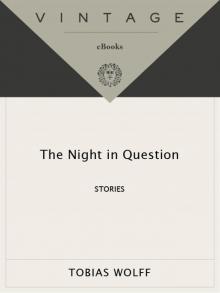 The Night in Question: Stories
The Night in Question: Stories In the Garden of the North American Martyrs
In the Garden of the North American Martyrs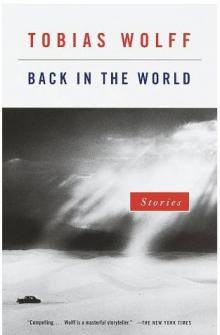 Back in the World: Stories
Back in the World: Stories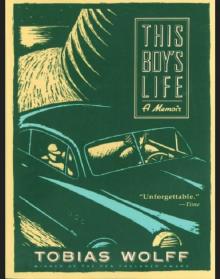 This Boy's Life
This Boy's Life Old School
Old School In Pharaoh's Army: Memories of the Lost War
In Pharaoh's Army: Memories of the Lost War Our Story Begins: New and Selected Stories
Our Story Begins: New and Selected Stories The Barracks Thief
The Barracks Thief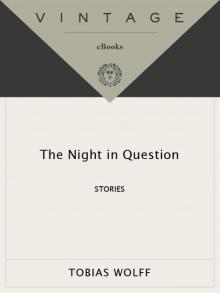 The Night In Question
The Night In Question In Pharaoh's Army
In Pharaoh's Army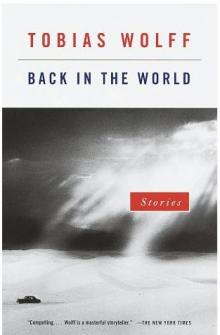 Back in the World
Back in the World